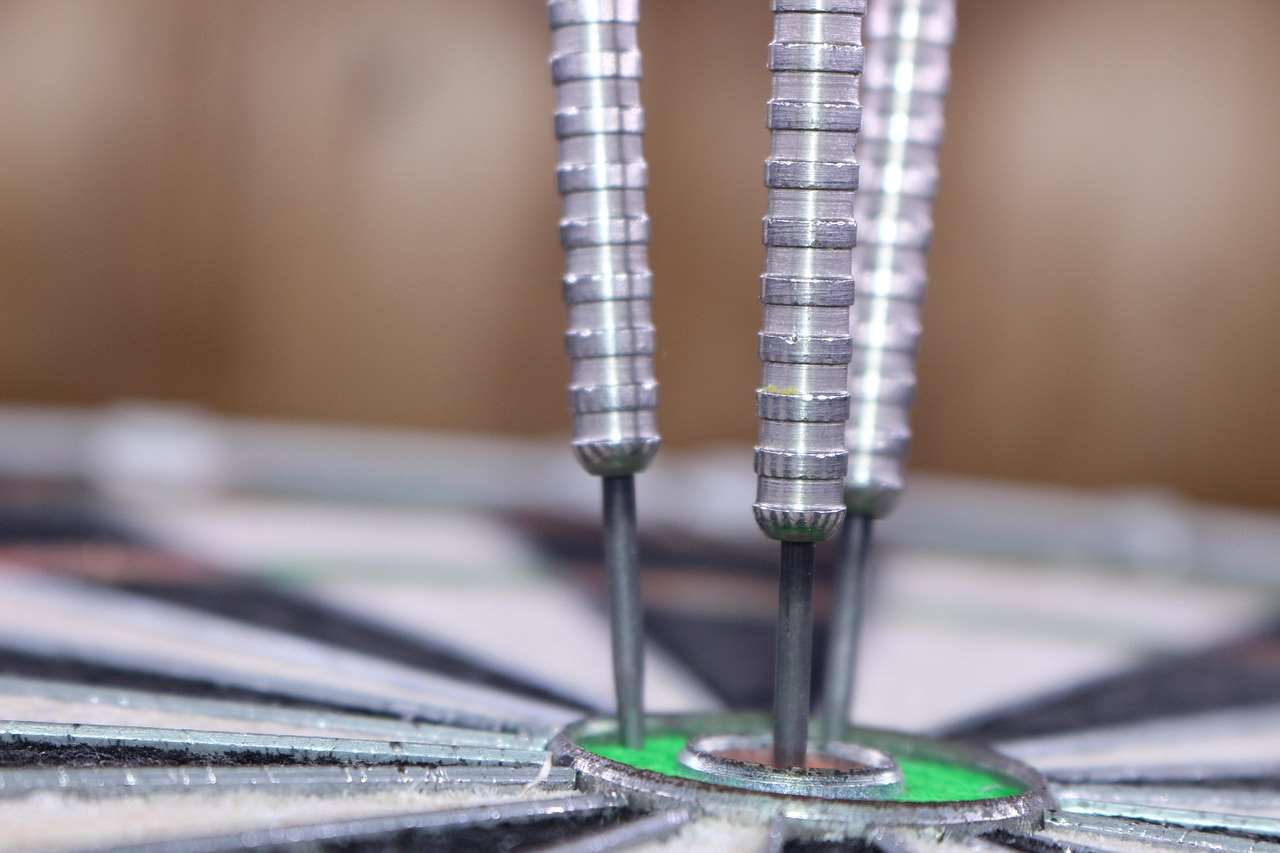Looking to elevate your team darts game? This team darts game resources guide provides everything you need to organize, strategize, and dominate your next match. We’ll cover game variations, skill-building exercises, team formation tips, and essential equipment to ensure your team’s success.
⚠️ Still Using Pen & Paper (or a Chalkboard)?! ⚠️
Step into the future! The Dart Counter App handles all the scoring, suggests checkouts, and tracks your stats automatically. It's easier than you think!
Try the Smart Dart Counter App FREE!Ready for an upgrade? Click above!
Building a Winning Team Darts Strategy
A successful team darts game goes beyond individual skill. It requires a well-defined strategy, clear communication, and a supportive team environment. Before even thinking about throwing a dart, spend time planning your approach. Consider each player’s strengths and weaknesses, and how they can complement each other. Are you focusing on consistency, high scores, or strategic finishes? Understanding your team’s profile is the first step towards victory. Proper practice routines and selecting the right equipment also go a long way.

Key Elements of a Team Darts Strategy
- Player Roles: Assign specific roles based on skill sets. Consider a consistent scorer, a high-out specialist, and someone who can handle pressure situations.
- Target Selection: Agree on preferred targets (20s, 19s, doubles) and communicate them clearly. Miscommunication can lead to wasted darts and missed opportunities.
- Checkout Strategy: Have a pre-determined checkout chart that everyone knows. This minimizes confusion and maximizes your chances of finishing.
- Practice Drills: Focus on team-based drills that simulate game situations. This will improve your coordination and decision-making under pressure.
Exploring Team Darts Game Variations
While 501 is the most common format, exploring different **darts variants fun games** can keep things interesting and improve your overall skills. Each variation emphasizes different aspects of the game, such as accuracy, strategy, and mental toughness.
Popular Team Darts Game Formats
- Cricket: A strategic game where you must close out numbers and outscore your opponents. It requires precise throwing and tactical decision-making.
- Around the Clock: A simple but effective game for improving accuracy. Each player must hit the numbers in sequence from 1 to 20, then bullseye.
- Killer: A challenging game where players must establish a number and then eliminate their opponents by hitting their number twice.
- Shanghai: A fast-paced game where players try to score the highest total in a limited number of rounds.

Remember to document the rules of any **old dart games rules** you try, or even create your own team variations!
Essential Equipment for Team Darts
Having the right equipment can significantly impact your team’s performance. While individual preferences vary, there are some essential items that every team should consider.
Darts and Dartboards
- Darts: Invest in a set of quality darts that suit your throwing style. Consider weight, grip, and balance.
- Dartboard: Choose a high-quality bristle dartboard that is durable and provides consistent scoring. A self-healing board is a good investment.
- Lighting: Ensure adequate lighting around the dartboard to improve visibility and reduce eye strain.
- Oche (Throw Line): Use a clearly marked oche to maintain consistent throwing distances.
Scoring and Record Keeping
- Scoreboard: Use a traditional chalkboard, whiteboard, or electronic scoreboard to keep track of scores.
- Checkout Chart: Keep a checkout chart handy to quickly calculate optimal checkout routes.
- Scorekeeping App/Software: Consider using a scorekeeping app or software to automate the scoring process and track statistics.

Building Team Cohesion and Communication
Darts is not just an individual sport; in a team setting, cohesion and communication are paramount. A team that works well together both on and off the oche is more likely to succeed.
Tips for Improving Team Cohesion
- Regular Practice Sessions: Schedule regular practice sessions to build camaraderie and improve coordination.
- Team Meetings: Hold team meetings to discuss strategy, review performance, and address any concerns.
- Social Activities: Participate in social activities outside of darts to strengthen relationships and build trust.
- Positive Reinforcement: Encourage and support each other, especially during challenging moments.
Many **historical dart game variations** emphasize teamwork, so studying them can also foster team spirit.
Analyzing Performance and Adjusting Strategy
To continuously improve, it’s crucial to analyze your team’s performance and make adjustments as needed. This involves tracking statistics, identifying areas for improvement, and refining your strategy.
Key Performance Indicators (KPIs) to Track
- Average Score per Dart (APD): This measures your team’s overall scoring efficiency.
- Checkout Percentage: This indicates how often you successfully finish legs.
- High Scores (180s, 140s): These reflect your team’s ability to score big points.
- Darts to Finish (DTF): This measures how quickly you close out legs.
Using Data to Improve Your Game
By tracking these KPIs, you can identify areas where your team excels and areas where you need to improve. For example, if your checkout percentage is low, you might focus on practicing doubles and checkout routines. If your APD is low, you might work on improving your consistency and accuracy.

Don’t let these **forgotten pub dart games** distract you from the key performance metrics.
Finding and Utilizing Team Darts Game Resources
There’s a wealth of information available to help you improve your team darts game. This team darts game resources guide wouldn’t be complete without pointing you to some of the best.
Online Resources
- Darts Websites and Forums: Many websites and online forums are dedicated to darts. These resources offer tips, advice, and discussions on various aspects of the game.
- YouTube Channels: Several YouTube channels provide instructional videos and analysis of darts techniques and strategies.
- Dart Scoring Apps and Software: As mentioned earlier, these tools can help you track statistics and analyze your performance.
Offline Resources
- Darts Coaches and Trainers: Consider working with a darts coach or trainer to receive personalized instruction and guidance.
- Local Darts Leagues: Joining a local darts league provides opportunities to compete against other teams and learn from experienced players.
- Darts Books and Magazines: Several books and magazines offer in-depth coverage of darts techniques, strategies, and history.

Discovering a **rare dart game instructions** guide in an old book might give you unique ideas, too!
Adapting to Different Opponents and Environments
A versatile team can adapt to different opponents and playing environments. This requires flexibility, adaptability, and a willingness to adjust your strategy on the fly.
Strategies for Adapting to Different Opponents
- Scouting: If possible, scout your opponents beforehand to identify their strengths and weaknesses.
- Adjusting Your Target: Adapt your target selection based on your opponent’s scoring patterns.
- Varying Your Pace: Control the pace of the game to disrupt your opponent’s rhythm.
Adapting to Different Environments
- Lighting Conditions: Adjust your throwing technique based on the lighting conditions.
- Crowd Noise: Learn to focus and maintain your composure despite crowd noise.
- Dartboard Conditions: Be aware of the dartboard’s condition and adjust your throwing accordingly.
Remember, understanding the **history of darts games uk** can provide valuable context to current strategies.
Conclusion: Mastering Team Darts
Building a successful team darts game requires more than just individual skill. It demands strategic planning, effective communication, team cohesion, and a willingness to learn and adapt. By utilizing the **team darts game resources guide** provided here and continuously refining your approach, you can elevate your team’s performance and achieve your darts goals. Now it’s time to put these strategies into practice, refine your game, and dominate the competition!
Ready to take your team’s darts game to the next level? Start practicing, refine your strategy, and remember to communicate effectively. Good luck!
Hi, I’m Dieter, and I created Dartcounter (Dartcounterapp.com). My motivation wasn’t being a darts expert – quite the opposite! When I first started playing, I loved the game but found keeping accurate scores and tracking stats difficult and distracting.
I figured I couldn’t be the only one struggling with this. So, I decided to build a solution: an easy-to-use application that everyone, no matter their experience level, could use to manage scoring effortlessly.
My goal for Dartcounter was simple: let the app handle the numbers – the scoring, the averages, the stats, even checkout suggestions – so players could focus purely on their throw and enjoying the game. It began as a way to solve my own beginner’s problem, and I’m thrilled it has grown into a helpful tool for the wider darts community.